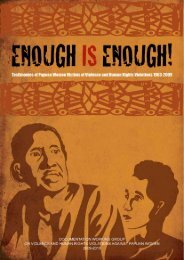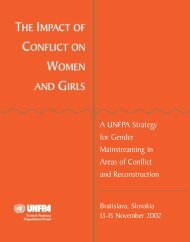Sexual exploitation and abuse by UN peacekeepers - PeaceWomen
Sexual exploitation and abuse by UN peacekeepers - PeaceWomen
Sexual exploitation and abuse by UN peacekeepers - PeaceWomen
You also want an ePaper? Increase the reach of your titles
YUMPU automatically turns print PDFs into web optimized ePapers that Google loves.
18<br />
Carlyn van der Mark<br />
Political Science Master Thesis - <strong>Sexual</strong> <strong>exploitation</strong> <strong>and</strong> <strong>UN</strong> <strong>peacekeepers</strong><br />
thesis will rely on media reports that have reported instances of sexual <strong>exploitation</strong> <strong>and</strong><br />
<strong>abuse</strong>. The countries with the most reports on allegations of sexual <strong>exploitation</strong> <strong>and</strong> <strong>abuse</strong><br />
during the MINUTASH <strong>and</strong> MONUC mission will be compared with their domestic laws of<br />
age of consent <strong>and</strong> legality of prostitution. The data that will show age of consent <strong>and</strong> legality<br />
of prostitution will be obtained from a general website that provides this information. It is<br />
important to note that the variable of accountability measures will be based on proxy<br />
measurements. One can only make assumptions for why the zero tolerance policy on<br />
prohibition is not implemented on a domestic level.<br />
Despite the difficulties in measurement towards accountability, this thesis will highlight that<br />
some of the cultural attributes within a domestic legal system prevents an implementation of<br />
a zero tolerance policy. Therefore it is significant to employ more accountability measures<br />
from the U.N‟s st<strong>and</strong>point to prevent further difficulties in implementing a zero tolerance<br />
policy from a legal perspective.<br />
The domestic context of the peacekeeping mission<br />
The last independent variable that will explain for the failure of the zero tolerance policy<br />
towards sexual <strong>exploitation</strong> <strong>and</strong> <strong>abuse</strong> is the domestic context of the peacekeeping mission.<br />
This variable is a difficult variable to test. Nonetheless it shall help indicate the socioeconomic<br />
status of women <strong>and</strong> teenage girls that may cause them to engage in acts of sexual<br />
<strong>exploitation</strong> <strong>and</strong> <strong>abuse</strong>. The reason for investigating the socio-economic conditions is because<br />
it brings agency to the women <strong>and</strong> teenage girls. Instead of only perceiving the women <strong>and</strong><br />
teenage girls as victims, this variable will help underst<strong>and</strong> why women <strong>and</strong> teenage girls are<br />
presented into a situation of sexual <strong>exploitation</strong>. This variable helps indicate the supply side<br />
of the dem<strong>and</strong> <strong>and</strong> supply cycle of <strong>exploitation</strong> <strong>and</strong> <strong>abuse</strong>. The zero tolerance policy does not<br />
acknowledge the importance of underst<strong>and</strong>ing the domestic context. This is why the policy<br />
has failed thus far.<br />
In order to investigate the domestic context as a failure of the zero tolerance policy, two<br />
indicators will be analyzed. The first is the gender inequality, <strong>and</strong> the second is the<br />
multidimensional poverty index. These indicators are taken from the Social institutions <strong>and</strong><br />
Gender index. The reason for using the Social institutions <strong>and</strong> Gender index is because they<br />
provide specific data on access to bank loans, political participation <strong>and</strong> attitudes towards<br />
domestic violence. These indicators will provide an underst<strong>and</strong>ing of the socio-economic




![IANSA [PDF, 2MB] - PeaceWomen](https://img.yumpu.com/25206379/1/190x123/iansa-pdf-2mb-peacewomen.jpg?quality=85)
![Commitments Sample [PDF, 93KB] - PeaceWomen](https://img.yumpu.com/25206331/1/190x245/commitments-sample-pdf-93kb-peacewomen.jpg?quality=85)










![A Toolkit for Advocacy and Action [PDF, 260KB] - Peace Women](https://img.yumpu.com/25205989/1/190x245/a-toolkit-for-advocacy-and-action-pdf-260kb-peace-women.jpg?quality=85)